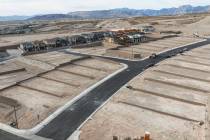Bills aim to solve mortgage problems
State lawmakers are considering two bills aimed at fixing problems in the residential mortgage business and helping Southern Nevada recover more quickly from the bursting of the real estate bubble.
Assembly Majority Floor Leader Marcus Conklin, D-Las Vegas, sponsored one bill that will enable homeowners to find out who owns their home loan.
Assembly Bill 284 is a response to robosignings, in which low-level employees of loan servicers signed affidavits that made incorrect claims about complicated matters. The people signing the affidavits often didn’t understand the documents or had not taken time to verify the facts. As a result, some houses have been wrongly foreclosed upon, analysts said.
The Conklin bill requires a home mortgage lender to file documents when the lender sells a mortgage loan. The documents must be filed within 60 days in the county where the property is located.
Homeowners struggling to avoid foreclosure have been unable to determine who owned their loans because the documents are filed electronically in a national database and aren’t maintained as public records.
Under Conklin’s bill, homeowners will be able to determine who owns their home mortgage by checking with the county recorder’s office, he said.
“Having that transparency in this process will greatly reduce foreclosures that should never have happened as a result of bad record-keeping, fraud and potential fraud from not having the proper records,” Conklin said.
Attorney Tisha Black Chernine of Black & Lobello wrote AB 284, which increases civil penalties for violations and makes mortgage fraud a more serious felony.
Under current law, she said, someone who doesn’t own a home mortgage can fraudulently foreclose on the mortgaged house.
“Right now, (someone) could go down and file a (mortgage) notice of default on his neighbor,” Black Chernine said.
The neighbor may be late in making mortgage payments, given the recession, she said. So the neighbor probably won’t challenge the foreclosure, because the neighbor has no idea who owns the mortgage.
Another person might buy a house only to discover that the seller didn’t own it, she said. Title companies often offer insurance that exempts them from liability in those cases, she said.
The Assembly passed the bill in a 33-9 vote and sent it to the Senate.
“You’d be hard-pressed to find a legitimate reason to not be in support of this bill,” Conklin said.
Black Chernine also favors another mortgage measure, Senate Bill 414, which the Senate approved and sent to the Assembly .
Nevada Bankers Association Chief Executive Officer William Uffelman said banks can accept the two bills.
“It’s the state’s policy on how to get out of the mortgage mess while providing some protection to borrowers,” Uffelman said.
Senate Bill 414, which was sponsored by the Senate Commerce, Labor and Energy Committee, deals with short sales, in which lenders agree to let homeowners sell homes for less than the amount owed on the mortgage.
The bill requires a bank or credit union to disclose whether it will waive its right to seek a judgment against the homeowner for the deficiency, or difference between the sales price and the mortgage balance.
“It brings certainty to the borrower and whether he can have closure and move on,” Black Chernine said.
Also, the financial institution must tell the seller the amount owed.
The protection applies only to mortgages used to buy single-family homes, not those obtained for refinancing, and to borrowers who continuously lived in the home after getting the mortgage.
If SB 414 becomes law, more short sales will occur and fewer houses will end up in foreclosures, Black Chernine said.
That’s good, because short-sale prices usually are 30 percent higher than prices of homes sold at foreclosure, which supports higher home appraisals.
The short-sale process, she said, “totally avoids the bad title problem,” she said.
“If we don’t have these two bills, it will take our state longer to recover,” Black Chernine said.
New residents will not move to Las Vegas, she said, if they cannot get clear title to homes and have certainty that the free fall in housing prices has stopped.
Contact reporter John G. Edwards at
jedwards@reviewjournal.com or 702-383-0420.


















